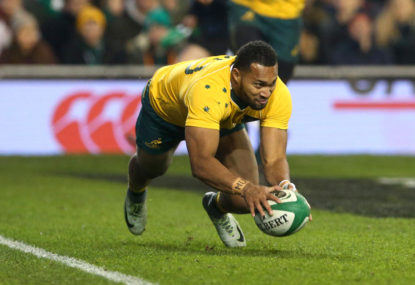Matt Toomua's compelling case to change Giteau's Law - The Roar Rugby Podcast
Speaking on the Roar Rugby Podcast with Christy Doran, Matt Toomua believes that removing restrictions entirely will open more doors than close for the…

It has been very much a mixed bag for the Wallabies this year, with a slow start, injuries and an unsettled line up for much of the year resulting in six wins from 15 starts. In the battle of the fly-halves, Bernard Foley is three wins from ten starts.
Forwards
A heavily competing back row/pack benefits from the inclusion of Simmons and other textbook tacklers. This was seen against the French with high competition at the break downs from all players.
With Adam Coleman, Rory Arnold and Lopeti Timani the dynamic of the tackle zone is less suited to the poachers, and Mike Hooper and Dean Mumm better starters.
My biggest concern about the game plan based around Coleman, Arnold and Timani is that once one is injured, there is no one waiting to step up. As seen against the Irish, one big man is not enough to win the collision space alone.
Hunting as a pack is something the Wallabies have had a hard time doing this year. For most games we have had lone players trying to stem the flood. Most notably Dave Pocock pilfering, but often Kane Douglas or Arnold attempting to win the gain line.
When we have fielded a team able to play off each others strengths we have surprised the opposition, as seen against France and Wales.
Against France we had three to four capable breakdown players all working together, while against the Welsh we had three big enforcers and dominated the gain line. In both cases our dominance in that area was unquestioned, and the result followed.
James Slipper has been targeted for his weak scrummaging by commentators here on The Roar. However when Slipper and Rob Simmons are paired the scrum looks solid. Simmons’ scrum power accommodates Slipper’s scrum weaknesses, while Slipper’s open field play is a point of difference. If the Coleman-Arnold-Timani combination is not available, I would be inclined to run Slipper and Simmons at the start.
Dean Mumm has been rightly noted and discussed, but any discussion needs to include his work rate and ability to lead the defensive line. I would still rather have Fardy.
Coach
Cheika’s admission that he doesn’t watch the opposition’s games is disturbing. The Wallabies style is not adjusted for the opponent. The Irish played an expansive game with ball in hand all year.
Against Australia this was enhanced by John Sexton being unavailable. However the Wallabies regularly dropped three players back waiting for a kick on multiple occasions. This left Henry Speight exposed and outnumbered during the match.
Backline
With Foley defending (hidden) at wing or hooker on opposition set piece play, quick turnover ball has always been very unstructured for the Wallabies this year.
In particular during Bledisloe 3, from a 5m defensive lineout the Wallabies got a clean steal. Will Genia passes to Reece Hodge to Dane Haylett-Petty to Kerevi, by now well inside our own goal-line with the All Blacks in our faces. It was a shambles. Someone needed to kick it. Against France, Kyle Godwin filled this role and Australia looked more fluent.
In a related note, exits have been questionable all year. While the Wallabies have now settled on Hodge, the number of times the Wallabies have played behind their own goal-line this year has been nerve wracking.
The last five minutes against England will not be mentioned.
With the backline now settled, Foley appears to have been given a roving commission with DHP and Hodge alternating as first receiver. This suits the game style of Steve Larkham and Cheika with the large bodies winning the gainline and providing quick ball. Foley remains a fresh live wire player able to utilise his acceleration even late in the game. It must be noted that the scoreboard and results have not benefited.
The Wallabies still lack long passing and accurate open field kicking options. Rush defences can and do contain the Wallabies, as seen against the All Blacks, Ireland, Scotland and now England.
This also means a deeper backline set-up as well. This was seen during the Ireland game twice around the 60th minute, and against England in the 72nd minute (Pocock’s cut-out pass).
A full discussion of the Wallabies game management and structure needs it’s own article.
Lastly, congratulations to Adam Coleman, Timani, Hodge, Haylett-Petty and Sefanaia Naivalu on their breakthrough performances.
Australia’s 2016 results
28 Loss 39 England (Ranked second)
7 Loss 23 England (Ranked second)
40 Loss 44 England (Ranked second)
8 Loss 42 All Blacks (Ranked first)
9 Loss 29 All Blacks (Ranked first)
23 Win 17 Sth Africa (Ranked sixth)
36 Win 20 Argentina (Ranked ninth)
10 Loss 18 Sth Africa (Ranked sixth)
33 Win 21 Argentina (Ranked ninth)
10 Loss 42 All Blacks (Ranked first)
32 Win 8 Wales (Ranked fifth)
23 Win 22 Scotland (Ranked seventh)
25 Win 23 France (Ranked eighth)
24 Loss 27 Ireland (Ranked fourth)
21 Loss 37 England (Ranked second)